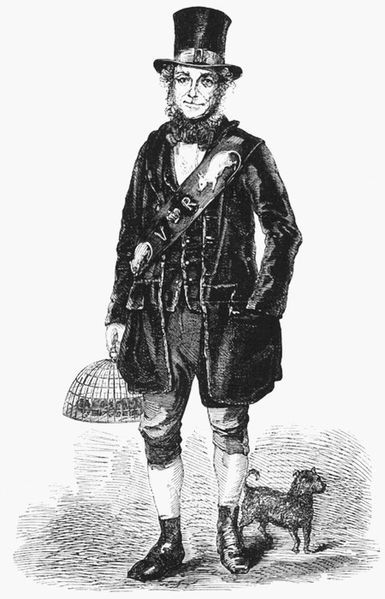You may dislike your boss, be fed up of spreadsheets and sick of office politics, but consider yourself lucky you aren't stuck in one of these jobs, prevalent in Victorian London.
Rat catcher

Rats were ubiquitous in Victorian London. The sanitary conditions were dire; filth and disease were commonplace, and the city was blighted by several cholera epidemics. Rat catching was big business, and the rodents proved highly saleable, especially to publicans who operated rat pits where they would make rats and dogs fight.
Rat catchers caught rats by hand, attracting them by rubbing a mixture of sweet-smelling oils on their hands and rummaging around in haystacks. Rats don't appreciate being manhandled by humans and they'd bite their captors, infecting many catchers. Rat catchers would make their own poisons and sell them at local markets. To demonstrate the efficiency of their poisons they would retrieve a rat from a cage and kill the unfortunate rodent in front of the crowd.
Chimney sweep

Children as young as six or seven would be sent up chimneys to clean away the soot. They didn't often get paid, and received meagre food for their efforts. The chimneys were very narrow and children would often get stuck in them. Children would also develop respiratory problems due to long term exposure to soot, and would die as a result. Not as fun as Mary Poppins makes it look, really.
Scavengers

We know a lot about the menial jobs Victorian Londoners did because of the meticulous work of Henry Mayhew, described as a clever journalist by some, and the father of sociology by others. He earned this reputation through his work, London Labour and the London Poor, a mammoth encyclopaedia of Victorian London that documented his travels through many of the capital's slums. It was on these excursions that Mayhew encountered the bone grubbers, toshers, collectors, and mudlarks who scavenged London's streets, sewers, and river banks for any odd and ends they could sell on.
Mudlarks
A mudlark usually a child or an adult on the verge of destitution who would scavenge the banks of the Thames at low tide for odd bits of rope, iron, coins or anything that could be sold on. The working conditions were filthy and uncomfortable, as a lot of the job involved wading through raw sewage. There's still a mudlarking community in London today, albeit for pleasure rather than employment, and with a lot less sewage.
Bone Grubbers
Bone grubbers would scavenge and pilfer bones from outside houses so they could sell them on to to bone mills where they would be used for soap and other products. Something to think about when you're in the shower.
Toshers
Toshers would journey into London's sewers with fishing nets in search of coins or nails to be sold on. But obviously, as they were fishing in a sewer, one imagines that they came across far more unpleasant things than this.
Pure finder
Looking for 'pure' sounds like quite a whimsical endeavour, but it was possibly the foulest scavenging job in Victorian Britain. Pure finders could often be seen trailing people walking their dogs, as the 'pure' they were looking for was in fact dog muck. They were collecting this to sell to tanneries around London, who would use it in the leather tanning process.
Workhouse

As dirty, smelly and unpleasant as scavenging jobs were in Victorian London, the privations of the scavengers paled in comparison to the sheer misery inflicted on paupers in the workhouse.
The working and living conditions inside 19th century workhouses were deliberately austere, to put people off from going there in the first place — only the very desperate ended up there. One of the most common jobs was stone breaking — sounds easy enough doesn’t it? But consider having to swing a heavy sledgehammer onto hefty boulders until the pieces were small enough to fit through the narrow holes in a wire mesh fence — and you'd be doing this for up to 12 hours a day.
If you weren't breaking your back when stone breaking, you'd be cutting your fingers to ribbons while picking oakum. This involved shredding old ropes from their strands down to the raw fibres of the hemp. Once you got down to the small fibres, separating them was a laborious process, and the strands would often dig into the pickers' fingers. Perhaps the only thing worse than the work was the remuneration, which was usually a lice ridden bed and a slop of porridge — and woe betide you if you asked for more.



